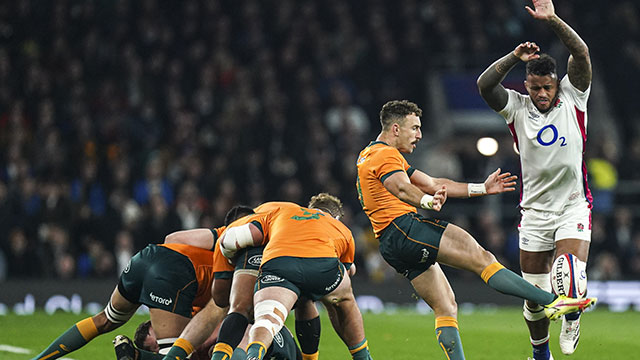England and Australia clash at Perth’s Optus Stadium on Saturday in the opening instalment of their three-Test series.
Here we look at five talking points heading into the match.
Courtney lays down the Law
In one of the biggest decisions of his seven-year England tenure, Eddie Jones has relieved Owen Farrell of the captaincy in favour of Courtney Lawes. Lawes is the incumbent from the Six Nations, but the assumption that Farrell would resume leadership duties now that he has been restored to full fitness has been detonated. Jones believes Farrell needs to concentrate on his own form after his spell out with ankle injuries, but equally the belligerent Saracens playmaker has not always been a comfortable fit for the role. With the 30-year-old accustomed to be being in control for club and country, the change will have an impact on team dynamics and his relationship with Lawes.
England’s rockstar in waiting
Described as a rugby “rockstar” in the making by England second row Jonny Hill, Henry Arundell has trained his way on to the bench for the first Test. Initially taken to Australia as an ‘apprentice player’, the uncapped 19-year-old London Irish sensation scored a dynamic 90-metre try on the practice field in Perth that thrilled onlookers and team-mates alike. It convinced Jones to name him among the reinforcements for the series opener at the Optus Stadium as his maiden professional season continues its remarkable trajectory. Arundell is the most exciting outside back produced by England for years and has the ability to ignite interest in the series.
Neville’s time finally comes
Ageing warriors who still harbour big dreams have a new champion – Cadeyrn Neville. The 33-year-old lock makes his debut a decade after appearing in a wider Wallabies squad for the first time in a triumph for perseverance. Central to the ACT Brumbies’ success this season, Neville has made an impact through his set-piece expertise and work rate around the field, a strength that coach Dave Rennie attributes to his past as a rower who represented Australia at the Youth Olympics. If stars such as Quade Cooper and Samu Kerevi take centre stage, it will because of the efforts of Neville and his fellow grafters in the pack.
Searching for form
An element of the unknown cloaks both sides heading into the series. Jones has picked a familiar starting XV to universal approval, but England have lost three successive matches and must repair the damage caused by another disappointing Six Nations. How well Marcus Smith combines with Farrell is just one of several uncertainties in a team whose identity is currently forged in graft rather than invention. Question marks also hover over Australia as they look to the Brumbies’ forward-orientated template to topple their old rivals. Their tour to the UK last autumn was even worse than England’s Six Nations and they face the challenge of lifting the Wallabies out of the doldrums they have inhabited since the 2015 World Cup.
Jones’ magic touch against the Wallabies
One of the reasons Rugby Football Union chief executive Bill Sweeney chose to remain loyal to Jones in the wake of another deflating Six Nations is because of his win percentage against the southern hemisphere nations and the value of that heading into next year’s World Cup. But it is the Australian’s remarkable record against the side he coached from 2001 to 2005 that forms the rump of that success with eight wins from as many Test since he took over at Twickenham, including a 3-0 series victory in Australia. The rivalry has lost its edge as a result, but the Wallabies enter the first Test as clear favourites and are confident of staging a successful ambush in Perth.


